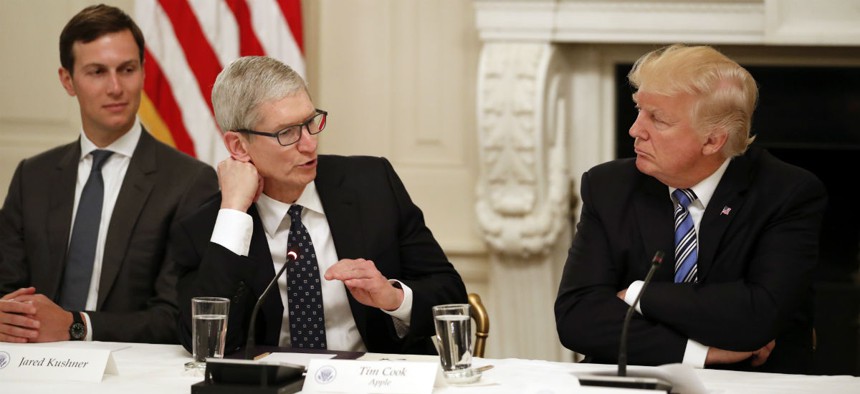An Insider’s View of Trump’s American Technology Council Meeting

Apple's Time Cook speaks to President Donald Trump during an American Technology Council meeting. Alex Brandon/AP
While a White House official said all the right things, Code for America Founder Jen Pahlka wanted to see more spine from tech executives.
President Donald Trump’s recent convocation of powerful technology leaders in Washington aroused “dramatically mixed emotions” in one participant who chose to attend despite ideological disagreements with the administration. The White House’s American Technology Council meeting convened a formidable Silicon Valley roster, and in closed-door sessions, tech leaders met with federal agency heads to discuss solutions to major tech challenges.
Those sessions covered topics including cloud strategy, analytics, cybersecurity, fraud, contracting reform, H-1B visas, and future technology, according to Jen Pahlka, founder of Code for America, a nonprofit that assigns developers to government projects at the state and local levels, and former White House deputy chief technology officer.
» Get the best federal technology news and ideas delivered right to your inbox. Sign up here.
Documenting the meeting in a recent Medium post, Pahlka wrote she was assigned to a session on “Digital Services Strategy.”
Some opted out of Trump’s economic advisory boards following his decision to pull the United States out of the Paris climate agreement, but Pahlka had urged tech leaders to put political differences aside to modernize government. In a Washington Post op-ed defending her decision to attend, she called Trump’s agenda and behavior “deeply disturbing”—including a move to ban people from Muslim-majority countries from the United States—but argued the technical topics the council addressed are “so boring to most people that they rarely receive any attention” and “connect directly to the government’s ability to function in service of the American people.”
Jared Kushner, Trump’s son-in-law and senior adviser who heads up the newly created White House Office of American Innovation dedicated to modernizing government, “said all the right things” at the meeting, Pahlka wrote.
“He talked about government services needing to work better for all Americans, and noted a few ways in which government makes it hard to do that, followed by a few ways his team at the Office of American Innovation is already removing those barriers," she wrote.
A U.S. Digital Service leader—part of a White House technology troubleshooting team—asked the executives present to describe how they get their organizations to focus on customers.
“[T]hat’s not much of a question,” Pahlka noted, explaining customers of private-sector goods can turn to alternatives if a company doesn't meet their needs. Government agencies, however, often enjoy a monopoly.
“Sure, companies can create conditions whereby they succeed while not meeting their users needs well, but this is the basic dynamic at play," she wrote. "And it’s not news to anyone. None of the CEOs present pointed that out. They answered the question in earnest, as if the government people in the room could not possibly be aware of this root cause. My hackles went up.”
Apple chief executive Tim Cook emphasized agencies should take the “dogfooding” approach, “making sure that the leadership and staff responsible for a service or product actually use it themselves,” she wrote.
Pahlka said she found some private-sector executives “condescending to the USDS staff in the room, who were being ‘techsplained’ the basic doctrine of their own organization,” and she explained to them “the government folks around the table were among those who had fixed the veterans healthcare application, launched the College Scorecard, and helped the Department of Health and Human Services write effective regulations by iteratively working with real users.”
The roundtable discussion of tech leaders later in the day, after the closed-session, did not incorporate government service users, Pahlka noted. And while she respected some leaders’ decision to opt out, “their voices would have made a difference, in part because those CEOs had less to lose by being respectfully critical.”
NEXT STORY: Parents Share How They Protect Their Kids Online


